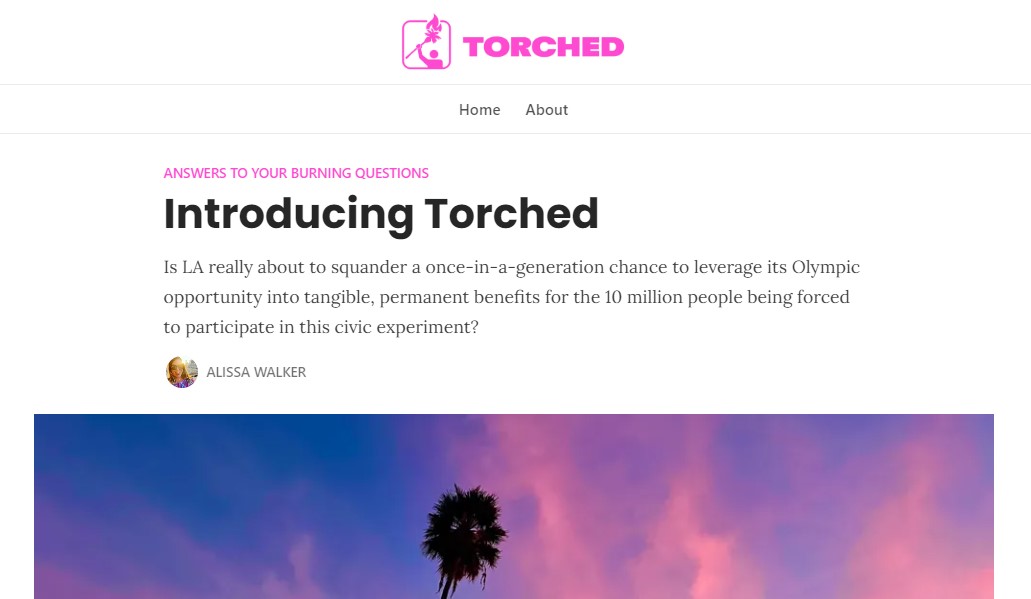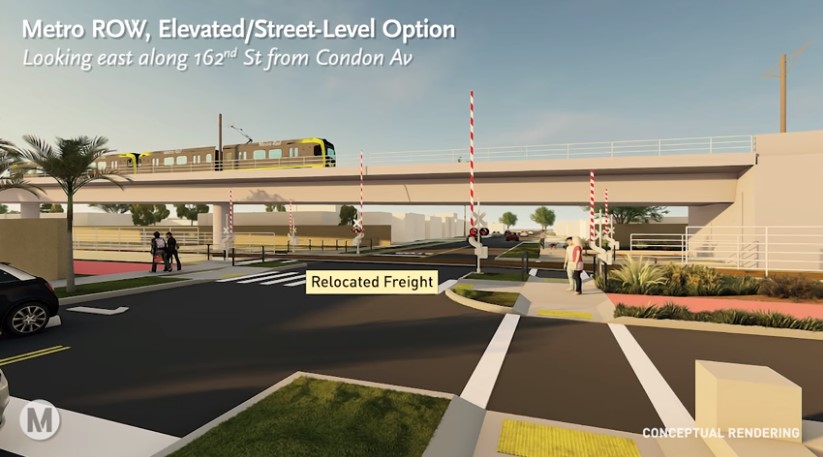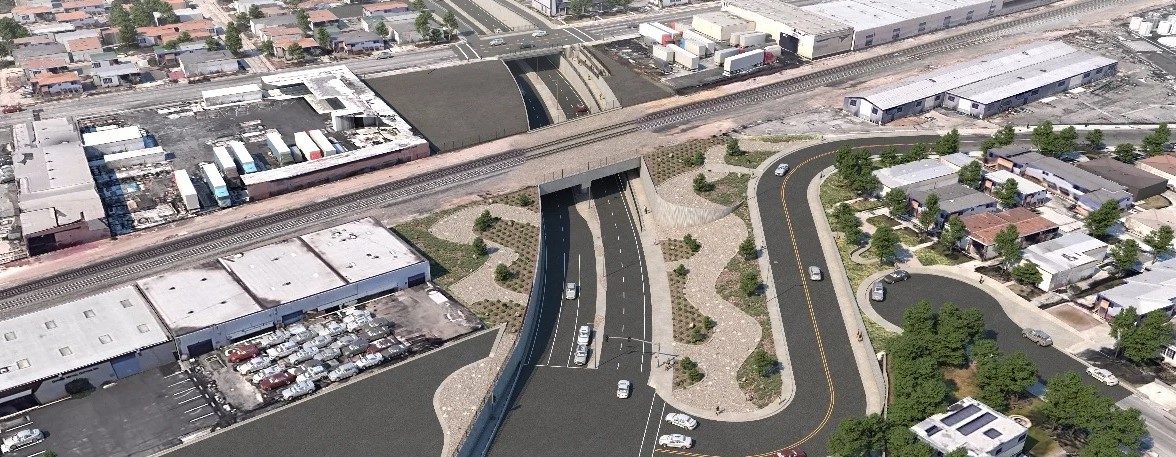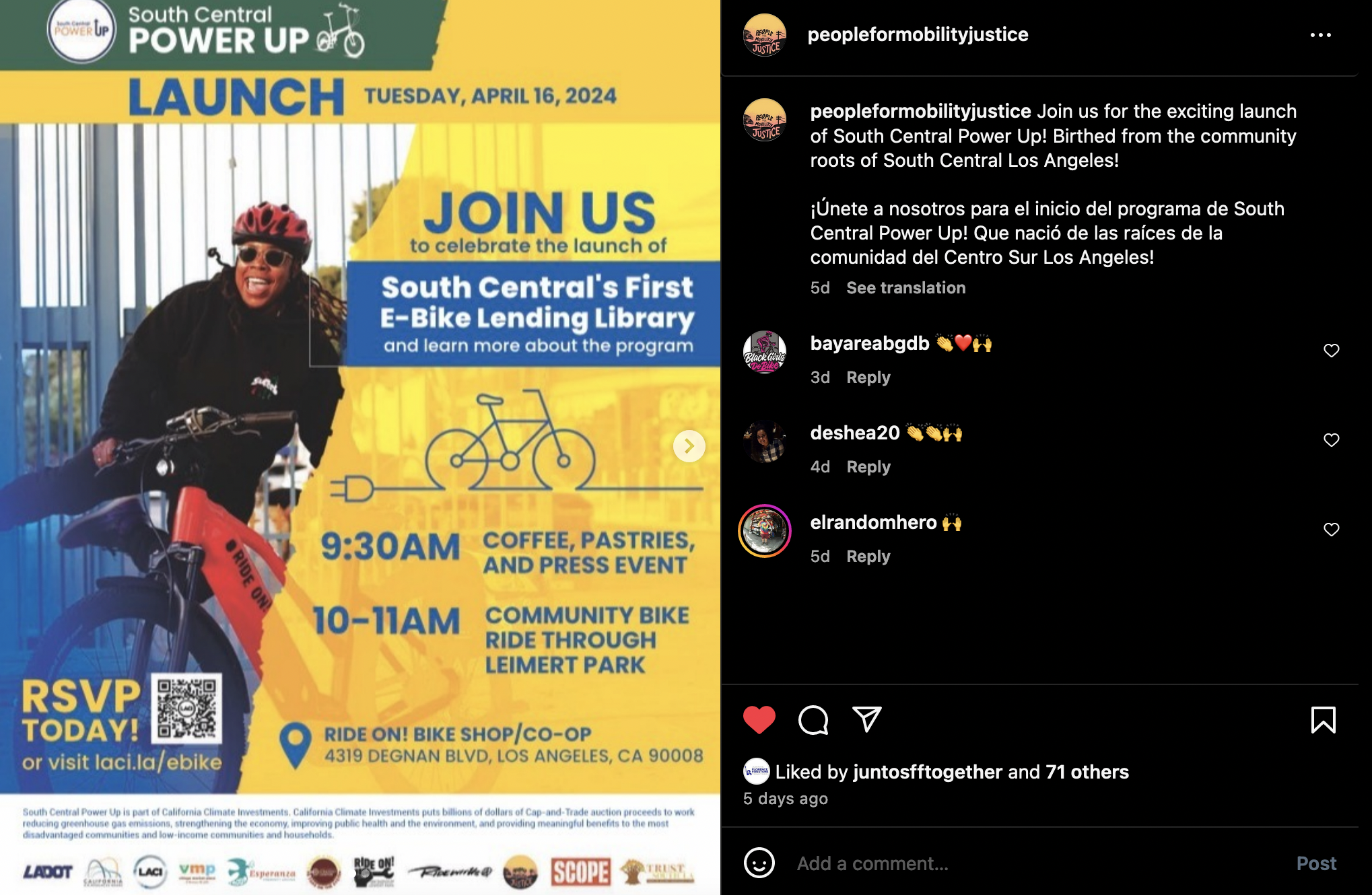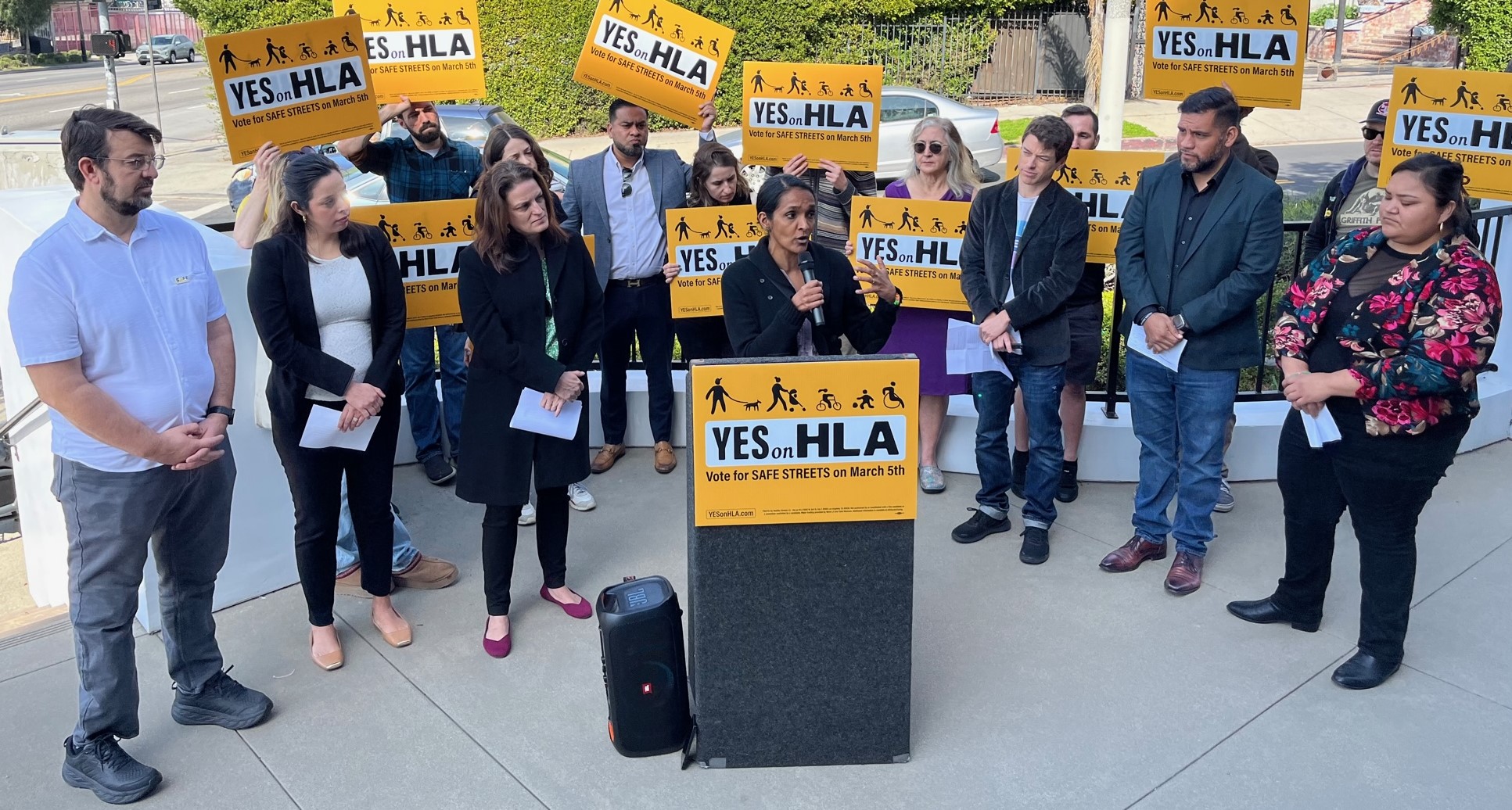Metro COVID-19 Recovery Task Force Recommends Bus Lanes, Masks, Bicycling
4:44 PM PDT on July 2, 2020

Cover of Metro Recovery Task Force June report
COVID-19 cases are spiking again in L.A. County, the United States, and many places worldwide. Metro has been responding to rapidly changing conditions for transit under COVID-19. The challenges are many and varied. The agency is facing a fiscal shortfall, responding to returning ridership by adding back service, working through the administrative hoops to get federal CARES Act transit funds, managing construction, and much more.
Also, within Metro, an internal task force is making plans for recovery. Metro's COVID-19 Recovery Task Force is looking to change some agency practices to facilitate several worthwhile goals, including:
- recommending actions that Metro can take to respond to and recover from the pandemic
- helping lead an equitable economic recovery for L.A. County
- advancing mobility without congestion as the ‘new normal’ after the pandemic.
The task force has reported back twice at recent Metro board Executive Management Committee Meetings; see presentations from June and May, as well as a 24-page June progress report.
It has also put forth a broad range of recommendations - from Metro staff telecommuting to online community outreach processes to improving air flow on buses - not all of which will be explored in this article. Generally, given the pandemic recession that has cut Metro sales tax revenues dramatically, the task force recommendations focus on low- to no-cost changes.
A few task force recommendations have already been put in place:
- In May, the board approved a motion allowing cities to repurpose open streets grant funding for other COVID streets improvements, including slow streets, outdoor dining, etc.
- The task force has recommended accelerating implementation of bus lanes, five of which Metro and the L.A. City Department of Transportation (LADOT) are already collaborating on. Downtown L.A.' s 5th and 6th Street bus lanes are expected to open this month.
- Since early June, Metro has been doing events to distribute some free masks at 12 stations.
Below are additional task force recommendations that could shape the way the agency does business - and some responses from mobility and equity advocates on how Metro should proceed in ways that are effective and equitable.
Faster Buses
The task force recommends Metro "partner with local jurisdictions to accelerate implementation of bus-only lanes and other speed and reliability measures." As mentioned above, Metro is working with LADOT to implement some downtown bus lanes, but Streets for All founder Michael Schneider points out that many already-approved bus lane projects have fallen through the cracks, especially under L.A. City's accelerated re-paving program, called ADAPT.
Sadly, under COVID, L.A. City is hell-bent on repaving lots of streets but not installing bus facilities, many of which were approved in 2015 as part of the city's Mobility Plan.
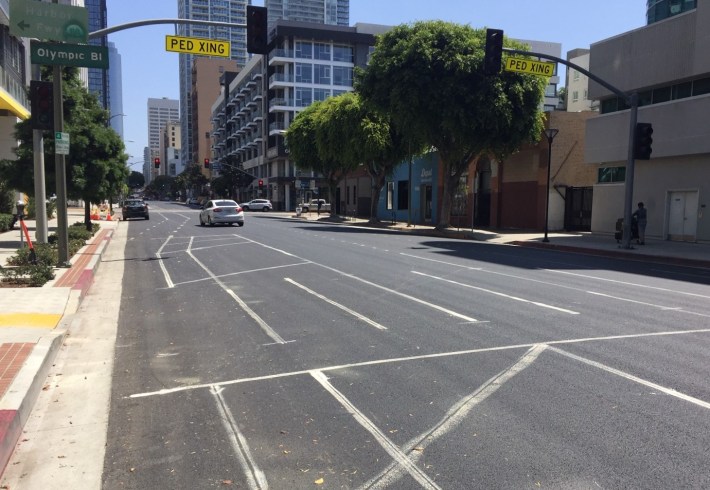
In downtown L.A., the city Bureau of Street Services recently repaved Olive Street, which, as Metro announced in May, is one of the five downtown streets where bus-only lanes will be installed. LADOT tweeted that bus-only lanes are "still under consideration," but they were omitted from the current striping configuration.
Outside of downtown, LADOT has implemented no new bus-only lanes under COVID and ADAPT, despite lots of plans and lots of re-paving. Schneider urges Metro to "offer incentives for cities to quickly implement" bus lane improvements. "When paired with a program like Los Angeles’ ADAPT program, a lot of this could happen very quickly," he states. "Bus lanes would obviously kickstart the bus as a more attractive alternative to the car during rush hour." Schneider is pushing for relatively quick implementation of bus and bike improvements approved for Venice Boulevard and San Vicente Boulevard, both slated to be re-paved soon under ADAPT.
No timeline or details have been announced for Metro's "other [bus] speed and reliability measures." One worthwhile measure should be all-door boarding, which speeds up buses, helps with COVID distancing, and even saves Metro money. In July 2019, the Metro board approved a Janice Hahn motion directing the agency to report back in December 2019 on "strategies to accelerate" all-door boarding . The deadline came and went with no report, though Metro staff continue to claim they are working on it... someday.
Masks on Transit
With transit agencies, retailers, California, etc. all requiring masks, Metro is doing some some mask giveaways at some stations. The task force recommends that Metro's "mask distribution be based on equity and need" which already points to a focus on rail/BRT stations being questionable - what about bus lines?
The task force recommends that Metro "supplement mask distribution by licensing vendors to sell masks on our properties" and recommends Metro administer a program to license one vendor per station.
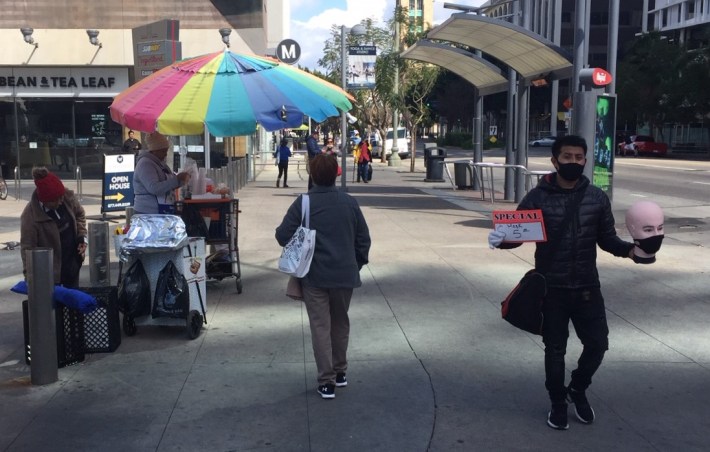
It is telling that the task force reports and presentations make no acknowledgement that Metro is even aware that lots of street vendors are already selling masks at Metro stations and on train lines.
Though Metro has taken small steps to legalize some street vending at MacArthur Park Station, the agency's formalized process has created as many problems as it has solved. And Metro's primary response to extensive unofficial vending continues to be problematic policing; this punitive approach was reinforced by Metro's own promotional videos stigmatizing vendors.
Inclusive Action for the City Executive Director Rudy Espinoza calls vendors pivoting their businesses to selling masks, another example of vendor ingenuity. Espinoza advises that "if Metro was serious about equity, they should most definitely engage street vendors in making vending sales happen." He recommends Metro "engage with organizations who have been working with street vendors for a long time," and "organize a group of vendor leaders to inform the project," including a paid organizer or two to staff the project. Espinoza also recommends leveraging Metro's Transit-Oriented Communities Small Business Loan program to provide low-interest loans to street vendors who are official mask purveyors for Metro.
When asked if mask giveaways would potentially undermine street vendor mask sales, Espinoza responded, "I think giving away masks is great." He recommended prioritizing mask giveaways "in neighborhoods and bus routes that have the lowest-income riders."
Bikes Bikes Bikes
Metro's Recovery Task Force recommends getting more Angelenos bicycling. Though this has long been worthwhile for health, air quality, climate, affordability, etc., a new reason cited is "to help prevent overcrowding on transit." There are several components to this recommendation - from bike-share to bike infrastructure to the distribution of bicycles.
Bike-Share
Many cities are seeing surges in bicycling and bike-share, in part due to commuters being wary of viral transmission risk in enclosed settings including transit, ride-hail, carpools, and vanpools. Bicycling presents an outdoor, socially-distanced, and therefore less risky transportation option. Though Southern California bike-share has not reported a ridership surge, Metro observed that though bike-share ridership declined under COVID, it declined less than bus and rail ridership.
Metro is currently studying options to "improve/restructure" Metro Bike Share with recommendations scheduled to go to the Metro board in September. The stated goals of the restructuring include "more bikes [be made] available in areas where low-income residents and marginalized communities live and work," though Metro and many other bike-share operators have historically found it difficult for bike-share to meet mobility needs for low-income communities.
Metro is studying a couple of bike-share options, though both of these are somewhat vague:
- "Re-bid contract with potential partners, such as municipalities and college campuses, to develop a no-cost, countywide bike-share system"
- "Bring Metro Bike Share operation and maintenance ‘in-house’ as a core Metro operation performed by Metro staff that can be located at all Metro stations"
In addition, Metro is stepping up bike-share promotions, including a recently announced new free 30-day trial membership for essential workers.
Streets for All's Schneider urges the agency to "dramatically expand Metro Bike Share, now... by blanketing the county with stations." Schneider stresses that "having [bike-share] accessible across L.A. County could be a huge step in not pushing transit-fearing riders into cars during COVID," especially when private micro-mobility companies, including JUMP, are pulling their devices off the street.
Schneider emphasizes that safe bike infrastructure (more on this below) is needed to make bike-share a bigger success, "Metro Bike Share would be massively more popular if people didn’t feel like they were going to die riding."
Bikeway Infrastructure
Metro's task force recommends a "quick roll-out of more bike infrastructure." The lack of safe, convenient places to bike has long been a limiting factor inhibiting bicycling in Southern California. What is tricky for Metro is that bikeways are largely out of Metro's jurisdiction. Metro has roles to play, but municipalities - primarily cities - are ultimately responsible for the bike-unfriendly state of local streets. The task force says Metro should "partner with cities on strategies for rapid deployment of bike improvements."
This is happening in big ways in other places, including Paris. But Biking in L.A.' s Ted Rogers laments that "we’re already very late to the party. Other cities around the world began this months ago during the lockdown, when it was relatively easy and affordable to make these changes. Now the work will have to be done amid the crush of impatient L.A. drivers." Rogers notes that improved infrastructure "would accommodate the countless people who have begun biking during the lockdown to such a degree that it has emptied bike shops of almost all bicycles, now and for the near future. These less experienced riders will need safe spaces to ride their bikes, as traffic levels continue to rise; otherwise, they will return to their cars, and we will lose a once-in-a-generational opportunity to reduce motor vehicle usage."
The L.A. County Bicycle Coalition Senior Director for Policy and Partnerships Kevin Shin welcomes Metro "seriously examining this moment as an opportunity to support bicycling," but cautions that "quick builds frequently don’t support healthy, equitable, and sustainable streets for our most impacted communities.” Shin encourages Metro to intentionally prioritize "the health and economic needs of our most vulnerable communities.”
A green transportation advocate who did not want to be attributed urged Metro to start with improvements to its own corridors. Metro, which already does transit construction in cities, could similarly take the lead for transit corridor bikeways, including upgrading the gutter lane Expo Line bikeway east of La Cienega where they could "take a travel lane and make the whole thing protected all the way to Figueroa," as well as "get the gap in Cheviot Hills closed asap with tactical materials." Metro could also take the lead on pop-up protected bike lanes along the Red, Green, and Blue Line corridors. Similarly, Metro could help bus travel by taking the lead on adding left-side bike lanes on one-way streets used by Metro buses.
Bike Distribution
Metro's task force is also recommending that the agency spend an estimated $80,000 to "develop a pilot to distribute bicycles."
This coincides with a few local efforts to gets bikes into the hands of Angelenos who want them. The L.A. County Bicycle Coalition is helping with Bike Match, a program that coordinates getting donated bikes to recipients. LACBC and other organizations are collaborating on programs to repair and prepare bikes for distribution. These bikes include some privately donated ones, as well as a nascent effort to distribute Metro's abandoned/confiscated bicycles. LACBC was reluctant to give much information on these programs, as details are still being ironed out.
Relámpago Wheelery's Jimmy Lizama is working with the LACBC, the Bicycle Kitchen, and other bike co-ops to get several bike distribution programs going. Lizama states that the plan is to partner with community groups already working in low-income communities to get bikes to people - especially to essential workers. Lizama says he's looking forward to getting bikes out to interested low-income folks, and is hoping Metro will be able to fund a small program as well as to publicize bike distribution programs to bus riders.
Submit ideas for Metro Recovery
Metro is asking the public to submit suggestions for and feedback on the agency's recovery plan - via email COVID19recovery[at]metro.net or or using the comment box at the task force webpage. The deadline for submission is July 31.
Metro’s Recovery Task Force will host a virtual public meeting on Thursday, July 9 from 6 p.m. to 7:30 p.m. The meeting with take place in both Spanish and English.
Stay in touch
Sign up for our free newsletter
More from Streetsblog Los Angeles
Metro Looks to Approve Torrance C Line Extension Alignment
Selecting the relatively low-cost hybrid alternative should help the oft-delayed South Bay C Line extension move a step closer to reality
This Week In Livable Streets
CicLAvia returns to Venice Boulevard, Metro board committees, L.A. City Council Transportation Committee, Metro budget theater, and more
